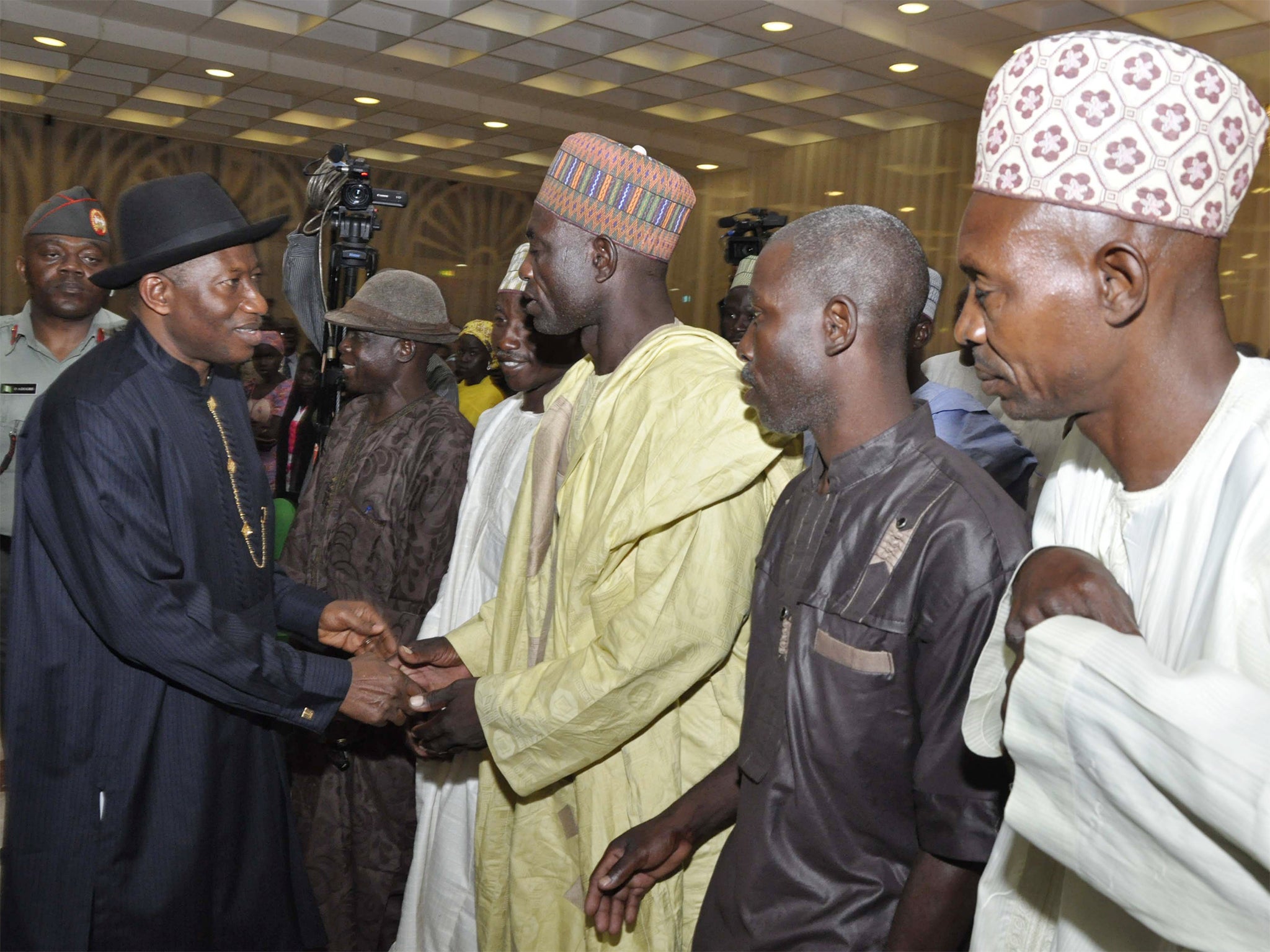Nigeria's kidnapped schoolgirls: After 100 days of hell, parents finally meet Nigeria’s President Goodluck Jonathan
As Boko Haram continue to stage attacks in the north, campaigner Malala Yousafzai brokers a meeting

Your support helps us to tell the story
From reproductive rights to climate change to Big Tech, The Independent is on the ground when the story is developing. Whether it's investigating the financials of Elon Musk's pro-Trump PAC or producing our latest documentary, 'The A Word', which shines a light on the American women fighting for reproductive rights, we know how important it is to parse out the facts from the messaging.
At such a critical moment in US history, we need reporters on the ground. Your donation allows us to keep sending journalists to speak to both sides of the story.
The Independent is trusted by Americans across the entire political spectrum. And unlike many other quality news outlets, we choose not to lock Americans out of our reporting and analysis with paywalls. We believe quality journalism should be available to everyone, paid for by those who can afford it.
Your support makes all the difference.Their abduction prompted global outrage, a massive online campaign and a search operation supported by international forces. But as Nigeria marks 100 days since more than 200 of its schoolgirls were abducted by Islamic extremists, their relatives are furious that almost nothing has changed.
President Goodluck Jonathan met parents and survivors of the Boko Haram attack for the first time today, following intense political pressure. That the meeting took 99 days to materialise was a source of resentment among affected families, who are increasingly vocal in their anger at the government’s failure to recover their daughters.
Most of the girls taken from school in Chibok on 14 April are still believed to be held in the Sambisa Forest – a huge area covering some 30,000sq miles that includes dense jungle and open savannah. According to official figures, 219 girls are still missing, but it is thought the true number could be far higher because some parents may have withheld their daughters’ names, fearing a stigma.
The last images parents saw of their girls in captivity were hardly reassuring. They came in the form of a Boko Haram video, broadcast more than two months ago. In it, their captors threatened to sell the students into slavery and as child brides. It also showed the girls dressed in clothes consistent with conservative Islam, with long headscarves and robes. Several even described on camera their “conversion” from Christianity to Islam.
Reliable updates on the girls’ fate are scarce, but at least two are said to have died of snake bites, according to a mediator who was liaising with Boko Haram. He told the Associated Press two months ago that at least 20 of the girls were ill – likely as a result of unsanitary conditions and being in a malarial region.
At least 11 parents of the missing girls have now died without seeing their daughters recovered. Seven of their fathers were among 51 bodies brought to Chibok hospital after an attack by Boko Haram on the nearby village of Kautakari this month. Another four parents are understood to have died of natural causes.
Previous promises that Mr Jonathan would visit Chibok, the north-eastern outpost where the girls were taken, were repeatedly broken. The meeting in the capital, Abuja, was only agreed after a public intervention by girls’ rights campaigner Malala Yousafzai, who met the President last week.
Dr Allen Manasseh, whose 16-year-old sister is among the missing and who chairs the Pan Chibok Youth Association, helped bring families to see the President in Abuja. He said: “The President had not met with any parents up until now... Many of these parents are angry. It’s not easy for a traumatised parent to stay for 100 days with their daughter in captivity.”
Many of the 57 girls who escaped after being abducted in April have not had access to healthcare for their injuries and are still not receiving education, according to Ms Yousafzai, who also visited them last week.
Speaking at the Girl Summit in London, Ms Yousafzai said: “Those girls jumped out of the truck and when they jumped their bodies got hurt. I met those girls and they told me that they are still not getting education and no one is supporting them and it was such a shame that we all speak for them and we all say let’s do something... but really we are doing nothing.
“So I was really sad when I heard those girls won’t have any protection, they don’t get any health facilities; no one has even taken them to a doctor to take care of their health because they got injured as well. They were in such a bad condition and their parents also need support.”
The global reach of a campaign to rescue the captured girls, played out on social media under the hashtag #BringBackOurGirls, has only made Nigeria’s failure to rescue them more embarrassing for Mr Jonathan.
The director of Nigeria’s State Security Service, Ita Ekpeyong, said: “We know where they are, but we don’t want to endanger their lives. That is the truth. We want to take it gradually and release them at the appropriate time. We know where they are. You can go to bed with that.”
According to the American-based African news website, Sahara Reporters, the release of most of the abducted girls will happen soon following secret negotiations.
Join our commenting forum
Join thought-provoking conversations, follow other Independent readers and see their replies
Comments